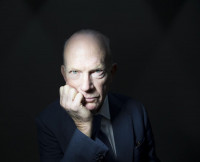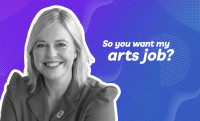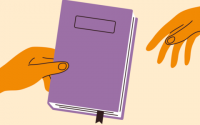
How to navigate the writer-editor relationship
artshub.co.uk – Monday November 7, 2022

Consider: you’ve just had your first or latest book accepted by a publishing house (congratulations!) and you’ve been assigned an editor to finesse the manuscript into publishable form. Or you’re a newbie editor who’s at the start of your career and wanting to know how to navigate the potentially tricky conversations with writers who are understandably a little protective about their words.
ArtsHub has gathered voices on both sides of the publication divide to offer some tips on how to successfully manage the writer-editor relationship.

Lee Child and Andrew Child on Discipline, Dread, and Writing Late at Night
crimereads.com – Wednesday October 26, 2022

Lee and Andrew Child’s new book, No Plan B, was released earlier today, so we asked them a few questions about writing routine, advice, and influence.
What time of day do you write (and why)?
Lee Child: I’m ruled by my biological clock, which mandates one unshakeable conclusion: nothing of value is ever achieved in the morning. Typically I get up late and spend a couple of hours moving from a comatose state into something resembling human life. Then I’ll start work about 1 or 2 in the afternoon. I have learned to sense the point when quality starts to diminish, which is usually about 6 hours later, so I’ll stop then. Often I get a second energy peak around midnight, so I’ll do another couple of hours before bed, especially in the later stages when the story is really rolling. Usually a book takes between 80 and 90 working days, spread out over about 7 months.
Andrew Child: My favorite time to write is at night. I like it best when darkness falls and the world shrinks down to the size of the pool of light that spills from my laptop screen. That just leaves me alone with the story I’m telling, nothing to distract, nothing to interfere.

It’s Time To Save Literature From The Woke Publishing Industry
thefederalist.com – Tuesday October 25, 2022

Joyce Carol Oates is a fixture in American letters — she’s won the National Book Award, two O. Henry Awards, the National Humanities Medal, the Jerusalem Prize, and she’s been nominated for the Pulitzer five times. She taught at Princeton for 36 years, and is, of course, an outspoken Trump critic. A Google search for “Joyce Carol Oates” and “feminist” yields more than half a million results.
And even she thinks the publishing industry has become intolerably politically correct. On Twitter, she recently observed, the “category of straight white males is the only category remaining for villains & awful people in fiction & film & popular culture.” Oates isn’t alone in observing the problem — in June, ubiquitous author James Patterson, whose potboilers have sold more than 400 million copies, said white male writers now face “another form of racism” in the woke publishing industry, before he was bullied into backtracking on his comments.
Of course, if you’ve set foot in a large bookstore recently, what Patterson is saying has obvious merit. On a recent trip to Barnes & Noble, a friend actually took photos and counted up the books on the six new fiction shelves displayed up front. Male authors made up less than 25 percent of the nearly 200 books displayed in the front of the store, and obviously, the percentage of men who were white and/or heterosexual was notably smaller than that.
Oates and Patterson are only now saying what many men with literary ambitions have long known. Iowa Writers Workshop graduate Alex Perez recently gave a scorched-earth interview to the Hobart Literary Journal where he discussed how male-centric literature was being deliberately shut out of publishing. During the interview, he had some choice words for the woke and disproportionately female gatekeepers of the industry:

Andrew Wylie, ‘The Jackal’ of books: ‘Amazon is like ISIS; it takes no prisoners’
english.elpais.com – Sunday October 23, 2022

The world’s leading literary agent speaks about Salman Rushdie, Stephen King, Donald Trump and the e-commerce giant
Among the literary giants included under the letter B on Andrew Wylie’s endless client list are Giorgio Bassani, Jorge Luis Borges, Saul Bellow, Paul and Jane Bowles, Joseph Brodsky, William Burroughs and Roberto Bolaño, eight of the twentieth century’s most important writers. Under C, one finds Guillermo Cabrera Infante, Italo Calvino and Albert Camus. Andrew Wylie, 74, is the world’s most powerful literary agent. His agency has offices in New York and London, and they employ 50 people. His reputation for ruthlessness in managing his clients’ rights has earned him a nickname in the publishing industry: the Jackal. However, he maintains that his goal is to defend authors whose books are of high literary quality but don’t often sell many copies. He asks the new agents he hires to prioritize the emotions that a book arouses in them, not how well they think it might sell.
Nobody, living or dead, has a list of clients as impressive as Wylie’s, which includes Milan Kundera, Antonio Muñoz Molina, Salman Rushdie, Art Spiegelman, Yasmina Reza, Shakespeare, Orhan Pamuk, Susan Sontag and Louise Glück. The agency represents so many luminaries that Wylie is unable to recall off the top of his head how many Nobel Prize-winning authors he counts as clients.

Why querying is hell for neurodivergents
thebookseller.com – Monday October 17, 2022

Literary agencies have taken steps to make their submissions policies more inclusive—and some simple adjustments can throw the doors wide open.
Querying: the word itself makes it seem straightforward. You query an agent—“Hey, would you like to represent my novel?”—and they say yes or no. It’s actually incredibly complicated, consisting of learning unique skills and new acronyms like R&R, FR and CNR. If you don’t know the terminology either, R&R is revise and resubmit, FR can be a full request or a full rejection and CNR is could not reply. Querying can make you consider: is my love for this book worth the challenges of pursuing publication?
Querying being difficult is not an experience unique to neurodivergent people and may not be everyone’s experience, since every neurodivergent person is fundamentally different—it’s in the name. But this article offers an insight into how agents can make the process more accessible and inclusive. The problems start early because there isn’t a set “guide” and no clear benchmark to measure how you are progressing. The percentage of partial or full requests a querying author may receive might be good for YA fantasy but not for adult cosmic horror, and it can change month on month. Add to this varied, long and intense wait times and it can cause serious issues for neurodivergent writers.

So you want my arts job: Literary agent
artshub.co.uk – Monday September 26, 2022

Alex Adsett is a literary agent and publishing consultant with over 25 years’ experience working in the publishing and bookselling industry. She has managed Alex Adsett Literary since 2008, and as an agent or consultant has helped thousands of authors review and negotiate their publishing deals.
As an agent she represents more than 50 authors of all ages and genres, including Melissa Lucashenko, Peter Greste, Isobelle Carmody, and many more. As a consultant, she reviews and negotiates publishing contracts for authors without an agent.

Gemma Arrowsmith: My top tips on writing for the radio
comedy.co.uk – Friday September 23, 2022

I've been writing and script editing radio for quite a while now and it's a medium I really enjoy working in. Here are some thoughts and observations I've had about writing audio. I hope they might be useful to you as you write your next audio masterpiece.

AI Writing Assistants: A Cure for Writer's Block or Modern-Day Clippy?
uk.pcmag.com – Tuesday September 20, 2022

In recent years, I've watched AI weave its way into our daily lives. It's written and directed movies, acted as a therapist, and visualized alternate realities. But I was curious to learn if AI is now smart enough to be an "intelligent writing assistant."
It's not too far off. As Microsoft points out in its Future of Work report, "AI is good at learning and scaling patterns, meaning for these activities people can instead focus on doing things in new ways and generating novel ideas. For example, someone might write a document by merely listing the ideas it should include. The details can be fleshed out automatically, much like developers use Copilot to flesh out ideas through code.”
But how realistic is that for the average would-be writer? We tried Jasper, Rytr, and HyperWrite to see if artificial intelligence can give our writing an edge.

Guide on submitting a manuscript
artshub.com.au – Monday September 19, 2022

Dear Emerging Creative,
This is one for the novice authors – because no one tells you how to do some of this stuff.
Submitting a manuscript to a publisher or magazine editor – whether it be short fiction, a non-fiction essay, or a novel – is a bit like writing a job application.
Celebrated New Zealand novelist Catherine Chidgey had this sage and pithy wisdom to offer: ’Make sure your work is typo-free – consider asking someone to proof it for you – and keep your cover letter brief.
‘How is your book similar to other successful books? How does it achieve something new?
‘Under no circumstances include emojis.’
The final sentence goes for most things in life.

Lucy Foley: ‘I never know the murderer when I start writing my books’
inews.co.uk – Sunday September 18, 2022

Lucy Foley’s hit crime novels are always set in glamorous places – a New Year’s Eve getaway at a highland lodge, a wedding at a remote Irish island, a beautiful Parisian apartment – but she usually writes them from somewhere completely different. “I wrote The Hunting Party in Iran, where it was really hot. I was finishing The Guest List [the Irish island] in an Airbnb in Paris when I came up with the idea for The Paris Apartment.” She likes to travel when she’s writing, and when we speak she has recently returned from six weeks in Northern Spain, where she rented an apartment with her toddler and got to work on a new book. Which is set, naturally, in the West Country.
Doesn’t it put her off, visiting wonderful new locations and then trying to immerse herself in entirely different ones while she’s writing? “It’s probably a bit w**ky to invoke Hemingway, but he said that to write properly about a place you have to have left it. And I do think there’s an element of that for me. It means you have to imagine somewhere more vividly.”
Get the free newsletter | Submit a news item or article | Get Writers' News for your website





